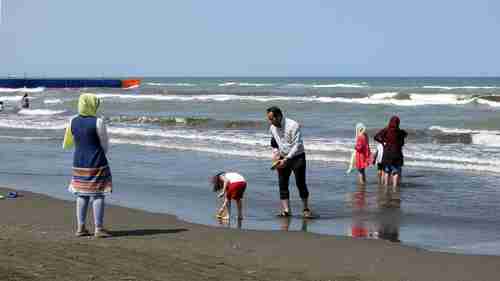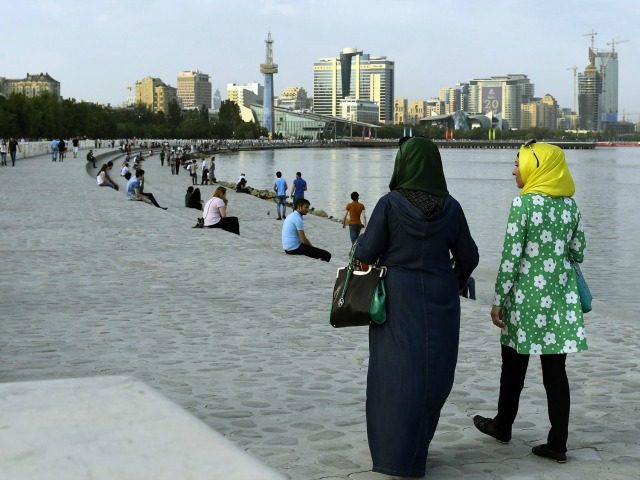This morning’s key headlines from GenerationalDynamics.com
- A ‘historic’ Caspian Sea agreement leaves major issues unresolved
- Major issues about commercial exploitation remain unresolved
A ‘historic’ Caspian Sea agreement leaves major issues unresolved

An Iranian family frolicking at the beach in the Caspian Sea port city of Gisum (Getty)
The presidents of five major countries — the countries bordering the Caspian Sea — all arrived in the Kazakhstan port city of Aktau on Sunday for a summit meeting to sign what is being called a “historic” agreement on settling the status of the Caspian Sea. The five countries are Russia, Iran, and three former Soviet states, Kazakhstan, Azerbaijan and Turkmenistan.
The five leaders signed agreements on trade and economic cooperation, cooperation in the transport sector. The leaders also agreed that the surface of the Caspian Sea would be freely available to everyone for activities like travel and fishing.
According to Russia’s president Vladimir Putin, the agreement “creates conditions for bringing cooperation between the countries to a qualitatively new level of partnership, for the development of close cooperation on different trajectories.” Whatever that means. BBC and Tass (Moscow) and Press TV (Tehran) and Al Jazeera and Deutsche Welle
Major issues about commercial exploitation remain unresolved
There are some 50 billion barrels of oil and nearly 9 trillion cubic meters of gas in proven or probable reserves in the Caspian seabed. At today’s prices, that’s worth several trillion dollars. The problem is how to divide those reserves, and Sunday’s “historic” agreement leaves those issues unsettled.
Prior to 1991, there were only two littoral states bordering the Caspian Sea — the Soviet Union and Iran. When the Soviet Union split up, suddenly there were five littoral states. Starting in 1996, these five countries attempted to reach agreement on how to split up the seabed among themselves. However, they were never able to reach agreement, and apparently that’s still true despite Sunday’s “historic” agreement.
The problem is that the Caspian Sea is a unique body of water in the world, and so there are no examples to provide guidance. The Caspian Sea in Central Asia is the largest inland body of water in the world. From the point of view of international law, it’s neither a sea nor a lake. It can’t be a lake because it’s too large, and it can’t be a sea because it’s connected to any of the world’s oceans.
International law provides formulas for dividing up the seabeds of lakes and seas. If the Caspian Sea is a sea, then the size of the region that each country gets depends on the length of the coastline bordering the sea. Under this formula, Azerbaijan, Russia and Kazakhstan would get the largest shares of the seabed, and so these countries favor it.
But if the Caspian Sea is a lake, then there are five littoral states, and so the seabed would be split up equally among them, giving them each 20% of the seabed. Iran and Turkmenistan favor this formula, because they have the shortest shorelines.
According to news reports, the agreement avoids calling either a sea or a lake, but gives it a special legal status, with an agreement in principle to a special formula for dividing up the seabed among the five countries. However, the formula is apparently close to the “sea” formula. In their closing statements, the leaders of Iran and Turkmenistan said that these issues remained unsettled, and that another summit meeting would be required within a few months.
The agreement apparently permits something that Russia had been opposing — allowing Turkmenistan to build a “Trans-Caspian Pipeline” (TCP) to permit delivery of its gas to Azerbaijan, where it would be pumped into pipelines leading west to Turkey and Europe. For 20 years, Russia has opposed the TCP, claiming that it poses a potential environmental hazard to the Caspian’s unique biosphere. However, this objection is laughable, since Russia’s Gazprom has laid several pipelines in the Black Sea, which also has a “unique biosphere.” It’s believed that Russia simply wants to block competition.
However, Russia and Iran did get their way in one more area. The agreement specifically forbids any but the five Caspian countries from deploying military forces on the Caspian Sea.
Recall that in April I wrote “28-Apr-18 World View — Kazakhstan to permit America to use Caspian ports to supply military in Afghanistan.” Russia and Iran objected to this, claiming that the Nato would use the transit of supplies to Afghanistan as an excuse to deploy American forces in the ports in Azerbaijan and Kazakhstan, and that the ports might turn into American military bases.
However, Kazakhstan committed that only nonmilitary supplies will be permitted to pass through the ports, and Sunday’s agreement seals that commitment. According to Kazakhstan’s foreign minister:
“Some representatives of Russian media and expert communities do not have a firm grasp of facts on the real situation regarding the transit of US non-military cargo via Kazakhstan…. It is about commercial railway transportation of non-lethal cargo via Kazakhstan to continue the operations to support the Afghan government, which is necessary for the whole international community…. Naturally, any military bases on the Caspian Sea are out of question.”
He added that this is not a change to any existing agreements. RFE/RL and Reuters and Bloomberg and SBS (Australia) and Sputnik (Moscow)
Related Articles:
- Kazakhstan to permit America to use Caspian ports to supply military in Afghanistan (28-Apr-2018)
- Russia dramatically escalates Syria war launching cruise missiles from Caspian Sea (08-Oct-2015)
- The Caspian Corridor and the New Silk Road (25-May-2016)
- Azerbaijan becomes the hub of the Caspian Trade Corridor, part of the new Silk Road (21-Jan-2016)
KEYS: Generational Dynamics, Caspian, Russia, Iran, Kazakhstan, Azerbaijan, Turkmenistan, Soviet Union, Vladimir Putin, Trans-Caspian Pipeline, TCP, Black Sea, Nato, Afghanistan
Permanent web link to this article
Receive daily World View columns by e-mail

COMMENTS
Please let us know if you're having issues with commenting.